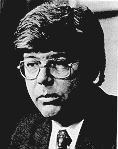John A. Svahn
 |
JOHN A. SVAHN John A. Svahn served as commissioner of Social security from 1981 to 1983. After serving for 1 year as Undersecretary of the Health and Human Services Department, President Reagan appointed him to his present position as Assistant to the President for Policy Development.
|
The tragic moment came at 4:59 p.m., November 5, 1982, just 3 days after Congressional elections that revolved all too deeply around the politics of the Social Security system. That was when the Old Age and Survivors Insurance Trust Fund--the "big one" in Social Security parlance--went technically insolvent and had to "borrow" money to make the November payments. This occurred despite a 10-year stretch of sure signs of coming insolvency that should have been read by politicians of both parties. Those signs were read by the system's 36 million beneficiaries and 117 million taxpayers--future beneficiaries all, or so they had hoped. As a result the potential political and social fallout of many more months of the Nation's failure to grapple once and for all with the long-term ills of the system would have been catastrophic. Official Washington did grapple with the system's legacy of weaknesses. And it did so in record time in response to recommendations of the National Commission on Social Security Reform created by President Ronald Reagan and the leadership of both parties in both Houses of the Congress. The Commission was as bipartisan and reflective of the forces that shape the system as possible. It represented the political leadership of the Congress, who make the laws that govern it; the private sector businesses and workers who pay the taxes that support it; and, in every member of the Commission, the taxpayers and future beneficiaries whose quality of life is now and will be affected by it. Their good work led to my second memorable "moment"--the magic of definitive Congressional action in the small hours of March 25, 1983, and the White House signing ceremony presided over by President Reagan and the Congressional leadership on the blustery morning of April 20. It was more than just a President's signature put down that day. It was a sure sign that Social Security will remain--as well it should--a program that will indeed keep its promises to generations to come. It was also a sign that the American political system still works. And works well on issues of great moment. My third memorable "moment" came in May, 1983. In retrospect, it was appropriately symbolic of my entire tenure at Social Security. Months and years of cries-crossing the Nation at once to warn of the ills of the system and to reassure present and future beneficiaries that whatever its ills, they would be cured. And months and yean of cries-crossing Capitol Hill to carry the same message about this most pervasive of all Federal programs. That "moment" occurred somewhere in the Aegean Sea on a long-overdue family vacation aboard a small sailboat, utterly cut off from any but the faintest of communications via short-wave radio from real-life problems back home or anywhere else in the world, for that matter. In fact, in a week aboard the sailboat, we heard only a 10-second snippet of news that faded in and out of clarity from an Armed Forces Radio station. The snippet: ". . The Social Security issue is back in the news today. . ." Indeed it was. Indeed it will ever be for years to come. It was a heady time for the 9th Commissioner. A time of political angst. Of personal stress. Of private joy at the marvels of the Social Security system. Joy that the system could be made to work. And joy over the good work of the tens of thousands of good men and women who are the Social Security Administration and who are the best people in the best organization with whom I've ever had the priv liege to work. That system--the Social Security Administration, itself--does indeed work. |
|